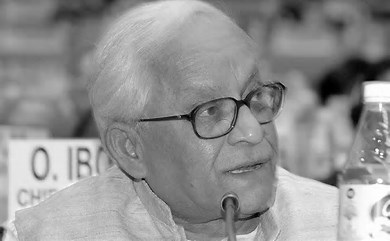Kolkata: Buddhadeb Bhattacharjee, the former chief minister of West Bengal and a prominent figure in the state’s communist politics, passed away at the age of 80. He died on Thursday morning in his modest two-room government apartment on Palm Avenue in south Kolkata, marking the end of an era for the Communist Party of India (Marxist) in West Bengal.
Bhattacharjee was known for his independent thinking within the regimented CPI(M), often straying from convention to chart his path. Condolence messages poured in from across the political spectrum, as millions mourned the loss of the leader who is survived by his wife Mira and daughter Suchetana.
Prime Minister Narendra Modi, despite being a political opponent, expressed his condolences, writing, “Saddened by the passing of Shri Buddhadeb Bhattacharjee, former CM of West Bengal. He was a political stalwart who served the state with commitment. My heartfelt condolences to his family and supporters. Om Shanti.”
West Bengal’s current Chief Minister, Mamata Banerjee, acknowledged Bhattacharjee’s impact, stating, “This is an extremely sad moment for us. I have known him for several decades. We met on many occasions. I offer my condolences to members of the CPI(M) party and all his followers.”
Bhattacharjee became chief minister in September 2000, succeeding Jyoti Basu, India’s longest-serving chief minister at the time. He was seen as the CPI(M)’s hope for modernizing the state’s bureaucratic systems and improving the image of party cadres.
A Reformist Agenda
During his 10-year tenure, Bhattacharjee aimed to revitalize industry in West Bengal with the slogan “Krishi amader bhitti, shilpo amader bhobishyot” (agriculture is our foundation, industry is our future). He signed several memorandums of understanding (MoUs) in 2005, including agreements with Indonesia’s Salim Group and Tata Motors for major industrial projects.
However, his efforts were often met with resistance. Controversies in Nandigram and Singur over land acquisition for industrial projects led to significant political challenges and public outcry, ultimately contributing to his party’s electoral defeat in 2011.
A Mixed Legacy
Bhattacharjee’s tenure was marked by significant achievements and controversies. He was the only CPI(M) leader to support the need for nuclear energy in India, backing former Prime Minister Manmohan Singh’s stance on the India-US nuclear deal.
Despite facing criticism for his industrial policies, Bhattacharjee remained committed to his vision for a modern and industrialized West Bengal. His intellectual image and cultural initiatives left a lasting impact on the state, even as political tides shifted against him.
Buddhadeb Bhattacharjee’s legacy as a leader who sought to balance traditional Marxist ideals with modern economic reforms will be remembered as a significant chapter in West Bengal’s political history.







